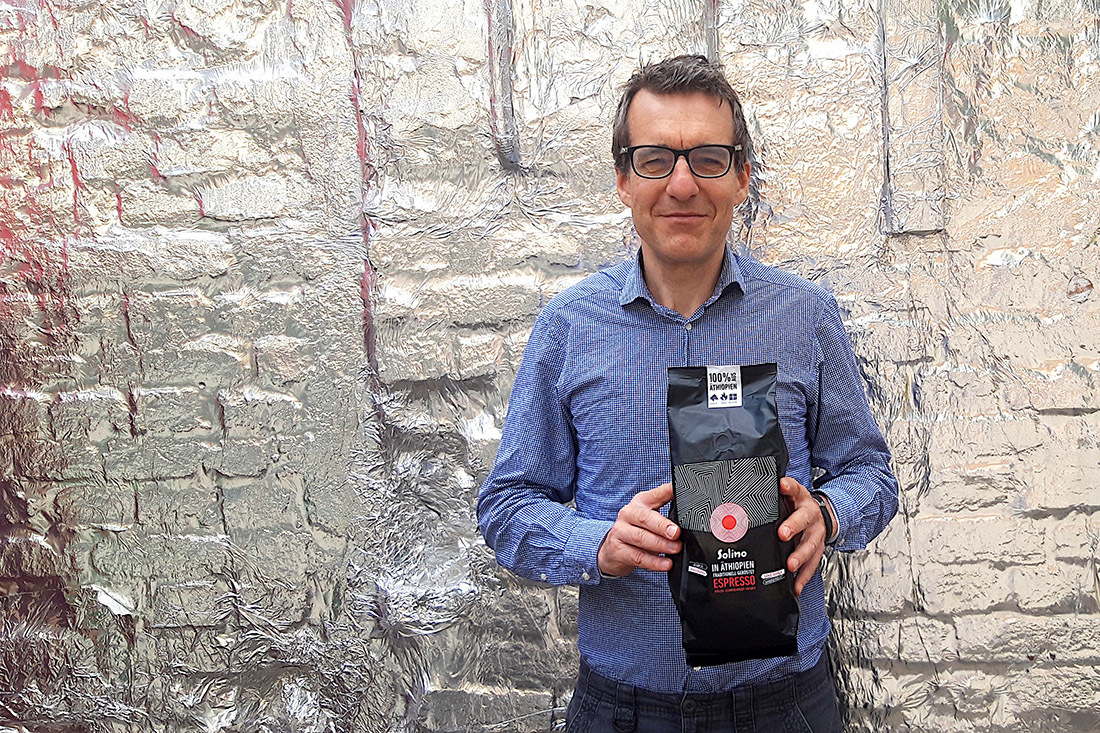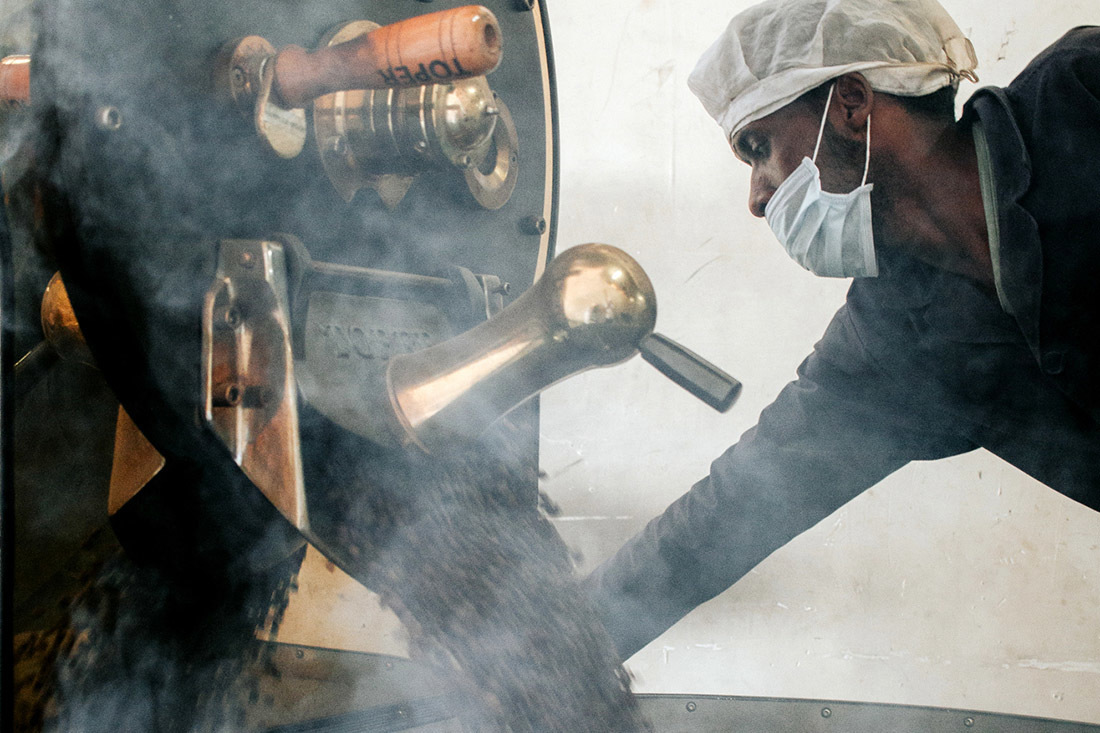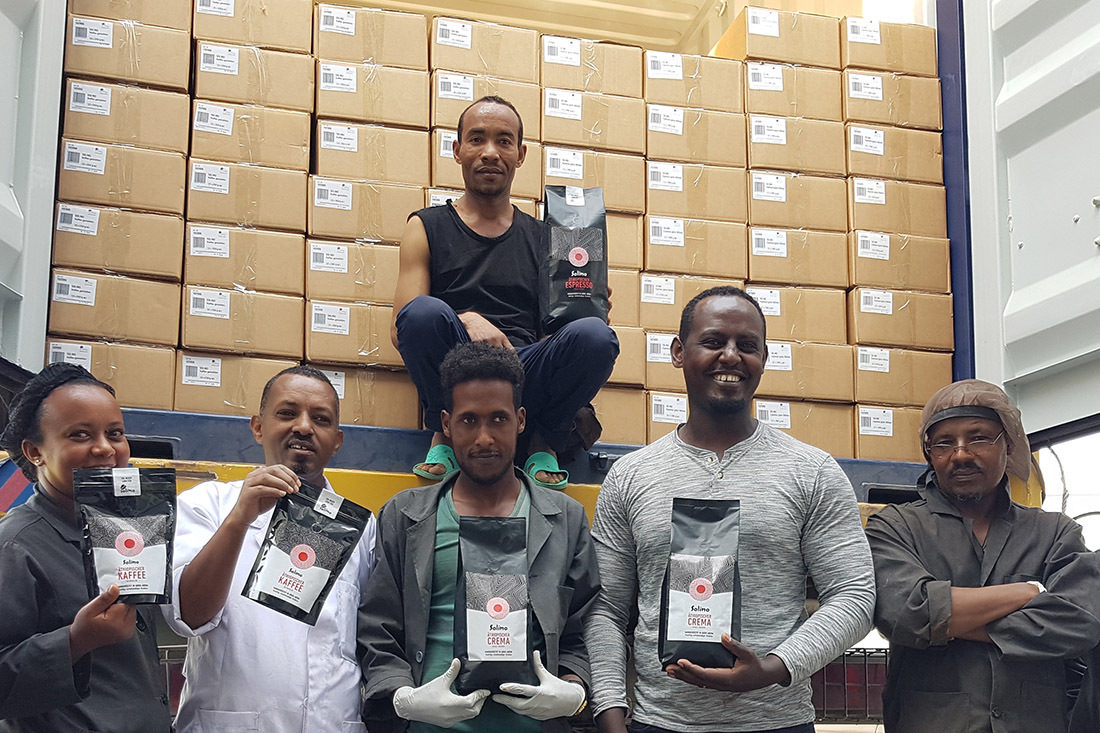A fairer cup of coffee: Bremerhaven businessman’s remarkable one-world project
Investing in Bremen
Germany is the world’s fourth-largest exporter of coffee – even though coffee berries don’t actually grow there. But even with fair-traded coffee the countries of origin are still excluded from the most lucrative part of the business.
The import of roasted beans would also bring environmental benefits. Coffee loses a quarter of its weight during roasting, making it more climate-friendly to transport. When Felix Ahlers realised this, he began to support an Ethiopian cooperative in their attempt to penetrate the German market
In the coffee business, the real value is added far from the countries of origin
There is something special about products or art works that carry a manual signature. But it isn’t just the initials of the master coffee roaster on the back of each one kilo bag that make the espresso it contains so remarkable. The fact that the arabica beans have been roasted by hand isn’t what makes them valuable, even if coffee lovers will regard it as an indicator of superior quality. What distinguishes Solino Coffee above all are its values. It is currently establishing itself in the German market – with the help of Bremerhaven businessman Felix Ahlers. Although the chairman of frozen food manufacturer Frosta does work in the food industry, he doesn’t normally have anything to do with coffee.

Profiting from every stage, from the farm to the coffee shop in Germany
There’s a reason why Felix Ahlers now also takes an interest in coffee, in his own time. Solino Coffee, a cooperative in Ethiopia, is one of the first producers in a country of origin that not only supplies raw materials. Instead, they are earning money along the entire supply chain, from the farm all the way to the shops in Germany. “We cannot permanently exclude the people in the source countries from the actual value creation process for their products,” says Felix Ahlers, who has been supporting the Solino project for ten years. Around 120 jobs have been created in Ethiopia so far. Eventually, the aim is to provide 1,000 permanent jobs.
Major European roasteries used drastic measures to hermetically seal their market against finished goods from source countries. “High import duties on roasted coffee ensured that only the much less heavily taxed raw coffee beans were imported into Germany,” Ahlers explains. Within this cosy protected space, the coffee companies were able to divide the market amongst themselves. From the 1930s to the 1960s, they were filling people’s cups to the brim with large volumes at low prices, turning the former luxury beverage into a mass market product. By the 1980s, German consumers had developed some brand awareness. Since then they’ve not simply been drinking coffee, but rather ‘Gala’, ‘Krönung’, ‘Feine Milde’ or ‘Beste Bohne’.

“Brands are not prepared to buy finished products from source countries”
By the end of the 1990s, a proper coffee culture had emerged, with a filter coffee or espresso machine in virtually every home. As with wine, the focus shifted to specific flavours, types of beans, qualities and countries of origin. But apart from some fair trade efforts in coffee retail, none of the added value was flowing back into the coffers of the growers, because the actual value creation was still taking place far from the countries of origin. Although import duties for some countries were removed twelve years ago, existing suppliers had already carved up the coffee business among themselves long before then. “There is no indication at all that major brands are now willing to buy finished products in the source countries,” says Ahlers.
New project builds on long-standing coffee tradition
Shortly after the tariff barriers came down, the Bremerhaven entrepreneur was on a private visit to East Africa. While attending a business conference in Addis Ababa, the 53-year-old met some Ethiopian coffee roasters. The region is regarded as the original home of coffee, and there is a long history of preparing the beverage. The traditional coffee ceremony consists of three cups, drunk one after the other. The first, called ‘arbol’, is the strongest. The second, poured after the grounds are brewed again, is ‘tona’, which is slightly weaker. This is followed by ‘berka’, the third brew, to see the guest on his way. Ahlers returned home with information and opinions about the world of coffee and its economic distortions through protectionism. The chance encounter led to the development of a concept – the Solino coffee project was born.
Ahlers supports marketing in Germany
The idea is simple yet captivating. “The Ethiopians are building up their own coffee production. The cooperative is in charge of everything from growing and harvesting the raw coffee berries through the processing and roasting to printing the packaging and shipping the finished goods,” Ahlers explains. “That means the entire value chain remains in the hands of the Ethiopians.” Ahlers contributes his expertise free of charge. “I promised the Ethiopian roasters I would support their marketing here in Germany.” No sooner said than done – Solino Coffee has been available in Germany for ten years now.
Entire value chain rooted in Ethiopia
Solino currently produces around 100 tonnes of roast coffee a year. Compared to the 1.1 million tonnes of raw coffee Germany imports every year – including around 300,000 tonnes through Bremen – that may not be very much. But for a country dominated by manual and small batch roasteries, it is a lot. And it has been a long and winding road to achieve even these quantities. The aim was always for the complete value chain to be firmly rooted in Ethiopia. But when coffee is roasted by hand or in small batches it inevitably becomes more difficult to guarantee a consistent quality across several batches. “That certainly was a challenge for this project as well,” Ahlers remembers. The same was true of other important aspects, such as producing the packaging or providing a reliable supply of raw coffee beans for the roasteries. “We mustn’t forget that Ethiopia is one of the poorest countries in the world, and that is reflected in the state of its infrastructure, and also in the machines and techniques deployed in the businesses,” he points out. But from the initial idea, Solino has developed into a reliable and serious business partner.
Solino as a reliable business partner
“More and more consumers are justifiably demanding to know where the food they buy comes from, and which hands it has gone through,” explains Ahlers based on experience from his own company, which is regarded as a pioneer in terms of offering transparency for customers. With the help of a Hamburg start-up, Solino has demonstrated how easily it can be done. Using a QR code on every pack of coffee and the website of start-up Ourz, coffee buyers are able to access a graphical representation of where the coffee was grown, harvested, roasted and packaged, and even which route it took to come to Germany. Consumers also get to know the roaster, whose signature adds that special touch to every package, through text and pictures.
Success Stories
Bremen’s Economy in Figures: Statistics 2025
The State of Bremen is a strong economic hub. A look at the latest statistics highlights its economic strength — summarising key data such as cargo volumes, export performance, industry turnover, and more.
Learn moreMedium-Sized Companies in Bremen Showcasing the Full Range of the Local Economy
Medium-sized companies form the backbone of Bremen’s economy. They create jobs and produce goods that are in demand worldwide. Here is a selection of ten businesses that illustrate the diversity of Bremen’s economic landscape.
Learn moreTwelve international food and beverage companies in Bremen
Becks and Melitta may be high-profile brands, but international food and beverage companies also manufacture lots of other products in Bremen and Bremerhaven. Here are twelve examples.
Learn more